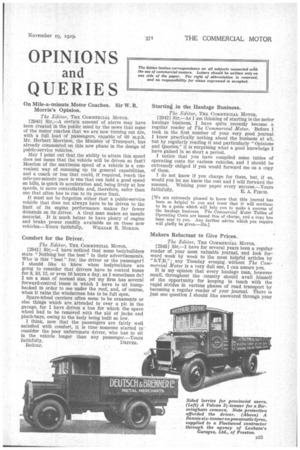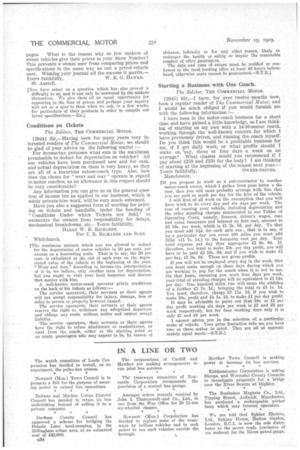OPINIONS
Page 67

Page 68

If you've noticed an error in this article please click here to report it so we can fix it.
and
QUERIES
On Mile-a-minute Motor Coaches. Sir W. R. Morris's Opinion.
The Editor, THE COMMERCIAL MOTOR.
[2940] Sir,—A certain amount of alarm May have been created in the public mind by the news that some of the motor coaches that we are now turning out ire, with a full load of passengers, capable of 60 'm.p.h. Mr. Herbert Morrison, the Minister of Transport, has already commented on this new phase in the design of public-service vehicles.
May I point out that the ability to attain this speed does not mean that the vehicle will be driven so fast? Mention of the maximum speed of a vehicle is a convenient way of summing up its general capabilities, and a coach or bus that could, if required, reach the mile-per-minute pace is one that can hold a good speed on hills, is quick in acceleration and, being lively at low speeds, is more controllable and, therefore, safer than one that often has to run to its power limit.
It must not be forgotten either that a public-service vehicle that does not always have to be driven to the limit of its engine performance makes far fewer demands on its driver. A tired man makes an unsafe motorist. It is much better to have plenty of engine and brake power readily available as on these new vehicles.—Yours faithfully, WILLIAM R. MORRIS.
Comfort for the Driver.
The Editor, THE COMMERCIAL MOTOR.
[2941] Sir,—I have noticed that some bodybuilders state "Nothing but the best" in their advertisements. Who is this " best " for, the driver or the passenger? I should like to know when bodybuilders are going to consider that drivers have to control buses for 8, 10, 12, or even 16 hours a day, as I sometimes do? I am a man of normal size, yet my firm has several forward-control buses in which I have to sit humpbacked in order to see under the roof, and, of course, when it rains the windscreen has to be full open.
Spare-..wheel carriers often seem to be ornaments or else things which are attended to over a pit in the garage, for I have driven a bus for which the spare wheel had to be removed with the aid of jacks and pinch-bars, owing to the body being built so low.
I think, now that the passengers are fairly well satisfied with comfort, it is time someone started to consider the poor unfortunate driver, who has to sit in the vehicle longer than any passenger.—Yours
faithfully, DRIVER. Redcar. Starting in the. Haulage Business.
The Editor, THE COMMERCIAL MOTOR.
[2942] Sir,—As I am thinking of starting in the motor haulage business, I have quite recently become a regular. reader of The Commercial Motor. Before I took, in the first number of your very good journal I knew practically nothing about the business at all, but by regularly reading it and particularly "Opinions and Queries," it is surprising what a good knowledge have gained in so short a period.
I notice that you have compiled some tables of operating costs for various vehicles, and I should be extremely obliged if you would forward me on a copy of them.
I do not know if you charge for them, but, if so, would you let me know. the cost and I will forward the amount. Wishing your paper every success.—Yours faithfully, R A. FINCH.
[We are extremely pleased to know that this journal has been so helpful to you and trust that it will continue to be a guide which will help you to make a success of the haulage business. The Commercial Motor Tables of Operating Costs are issued free of charge, and a copy has been sent to you. Any further advice which you require will gladly be given.—En.] Makers Reluctant to Give Prices.
The Editor, THE COMMERCIAL MOTOR.
[2943] Sir,—I have for several years been a regular reader of your most valuable journal, and look forward week by week to the most helpful articles by " S.T.R." • any Tuesday evening without The Commercial Motor is a very dull one, I can assure you.
It is my opinion that every haulage man, however small, throughout the country should avail himself of the opportunity for keeping in touch with the rapid strides in various phases of road transport by becoming a regular reader of your journal. There is just one question I should like answered through your pages. What is the reason why so few makers of steam vehicles give their prices in your Show :Number? This prevents a'steam user frOñL comparing prices and specifications in the same way as can a petrol-vehicle user. Wishing your journal all the success it ;merits.— Yours faithfully, W. R. G. HAWKE.
St. Austell. .
[You have asked us a question which has also proved a difficulty to IL% and it can only be answered by the makers themselves. We give them all an equal opportunity for appearing in the lists of prices, and perhaps your inquiry will act as a spur to them when we ask, in 4 few weeks, for particulars of their products in order to compile our latest specifications.—Enj Conditions on fickets The Editor, THE COMMERCIAL MOTOR.
[2944] Sir,—Having been for many years very interested readers of The Commercial Motor, we should be glad of your advice on the following matter :
For income-tax purposes what sum is the maximum permissible to deduct for depreciation on vehicles? All our vehicles have been purchased new and for cash, and actual depreciation on them is very heavy, as they are all of a luxurious saloon-coach type. Also, how does the clause for "wear and tear" operate in regard to motor coaches, as an allowance in this respect should be very considerable?
Any information you can give us on the general question of income tax as applied to our business, which is solely private-hire work, will be very much esteemed.
Have you also a suggested form of wording for printing on tickets and handbills, under the heading of "Conditions Under which Tickets are Sold," to exonerate the owners from responsibility for delays, mechanical breakdowns, etc.—Yours faithfully, HARRY W. B. RICHARDS, For J. R. RICHARDS AND SONS. Whitchurch.
The maximum amount which you are allowed to deduct for the depreciation of motor vehicles is 20 per cent. per annum on a descending scale. That is to say, the 20 per cent. is calculated at the end of each year on the depreciated value of the vehicle at the beginning of the year. "Wear and tear," according to income-tax interpretation of it is, we believe, only another term for depreciation, but you ought to visit your local inspector and discuss that matter with him.
A well-known motor-coach operator prints conditions on the back of his tickets as follows:— The service operators, their servants or their agents will not accept responsibility for injury, damage, loss or delay to person or property however caused.
The service operators, their servants or their agents reserve the right to withdraw any advertised departure and chlinge any route without notice and cannot accept liability.
The service operators, their servants or their agents have the right to refuse admittance or readmittance, or eject from the coach, either at the starting point or en route, passengers who may appear to be, by reason of
sickness, infirmity or for any other reason, likely to endanger the health or safety or impair the reasonable comfort of other passengers.
The date and time of return must be notified or confirmed to the local booking office at least 48 hours beforehand, otherwise scats cannot be guaranteed.—S.T.R.]
Starting a Business with One Coach.
The Editor, THE COMMERCIAL MOTOR.
[2945] Sir,—I have, for over twelve months now, been a regular reader of The Commercial Motor, and
,would be much obliged if you would furnish me with the following information
I have been in the motor-coach business for a short time and have gained a little knowledge, so I am thinking of starting on my own with a 14-16-seater coach, working through the well-known concern for which I have previously driven, and running the coach myself. Do you think this would be a profitable business for me, if I get daily work, or what profits should make on, 'say, three or four days a week on an average? • What chassis would you recommend if I pay about £250 and £250 for the body? I am thinking of starting at the beginning of the season next year.—
Yours faithfully, OWNER-DRIVER. Manchester,
[If you propose to work as a sub-contractor to another motor-coach owner, which I gather from your letter 's the case, then you will most probably arrange with him that you are paid so much per day for the hire of the vehicle.
I will first of all work on the assumption that you will have work to do every day and six days per week. The cost of running your vehicle, including depreciation and the other standing charges enumerated in our Tables of Operating Costs, namely, licences, driver's wages, rent and rates, insurance and interest on first cost, amount to £6 168. per week, which is £1 2s. 8d. per clay. To that you must add 31d. for each mile run; that is to say, if on a particular day you cover 100 miles you must add 325d. (£1 7s. id.) to the foregoing cost per day. Your total expense per day thus aggregates 12 9s. 9d. If, therefore, you want to make 10s. per day profit, you will have to be paid £2 19s. 91 and if you wish to make fI per day, £3 9s. 9d. These are gross profits.
If you will not be employed every day in the week, then you must make enough on those days during which you are working to, pay for the coach when it is not in use. On that basis, assuming you work four days per week, your total of standing charges will be equivalent to 11 14s. Per day. One hundred Miles run will mean the addition of a further £1 7s, 1c1., bringing the total to £3 1s. id. You must, therefore, charge £3 lia. id. if you wish to make 10s., profit and .14 is. id. to make £1 per day profit.
It may be advisable to point out that 10s. or £1 per day profit working six days per week is £3 and 16 per week respectively, but for four working days only it is only £2 and £4 per week.
cannot .advise you .in. the, selection of a particular make of vehicle. Your price limitation tells me you have two or three makes in mind. They are all of approximately equal merit.—S.T.R.]




















































































































